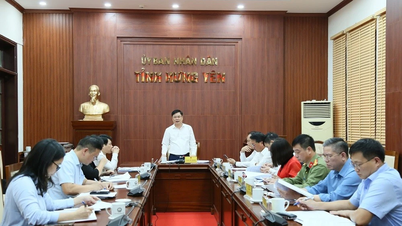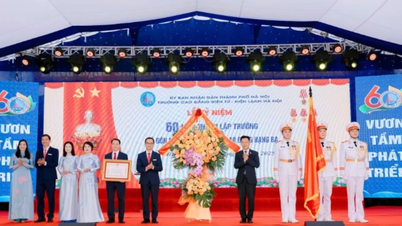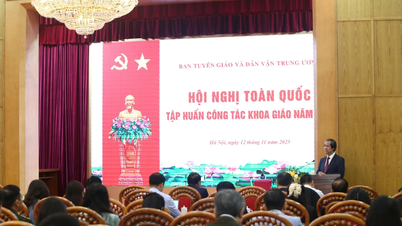Urgent need to develop digital human resources
Dr. Nguyen Huu Tho - Party Secretary, Chairman of the Council of Kien Giang University stated that in the context of digital economy and digital society becoming the main development trend globally, human resources are the decisive factor in the competitiveness of each country. Therefore, the early development and implementation of the Digital Human Resources Development Program is an urgent requirement today. The urgency of the Program is demonstrated through 5 core contents.
The first is to meet the requirements of transforming the growth model. The digital economy is expected to contribute an increasingly high proportion to the national GDP. Failure to develop digital human resources will cause the economy to fall behind and not be able to take advantage of new growth opportunities.
The second is to overcome the shortage of digitally skilled workers. Currently, many businesses are having difficulty recruiting high-tech personnel. Without focusing on retraining and upgrading skills, the Vietnamese workforce will face the risk of losing their jobs right at home.
Third is to ensure that national digital transformation takes place comprehensively. The success of digital transformation does not only come from technology, but the core lies in people. Digital human resources are the key condition for the development of digital government , digital economy and digital society.
Fourth is adapting to the rapid changes in the labor market. The development of automation and artificial intelligence (AI) is changing the global occupational structure. Digital human resources programs will help workers maintain their competitiveness in the face of market fluctuations.
Finally, the development and implementation of the Digital Human Resources Development Program will create a competitive advantage in international integration. High-quality digital human resources are a "magnet" to attract investment, especially from leading technology corporations...
Dr. Hoang Van Thanh - Head of the Department of Economic Law, Faculty of Law (Banking Academy) emphasized that the policy of building and implementing the Digital Human Resource Development Program to equip workers with comprehensive digital skills is meaningful as a soft infrastructure component of growth.
The National Digital Transformation Program, the National Strategy for Digital Economy and Digital Society Development, and the Strategy for E-Government Development towards Digital Government form a consistent institutional framework to shift the growth model from relying on capital and cheap labor to relying on knowledge, data, technology and innovation.

Concretize with administrative tools
Based on the reality, Dr. Hoang Van Thanh made some suggestions. Firstly, it is necessary to issue a two-tiered national digital skills framework that is internationally compatible to overcome the situation where each place has its own standards and it is difficult to compare training results.
Second, the skills framework needs to be operated by a micro-certification ecosystem with independent quality control, public disclosure of the national module catalog, module-occupation-level matching matrix and periodic certification exam schedule. As a result, workers can study 4-12 week modules directly linked to competency standards and accumulated credits; and businesses have common standards for recruiting and assessing competencies according to international occupational standards without having to redesign from scratch.
Third, on the financial side, a co-payment mechanism should be piloted following the Skills Development Levy model - Skills Development Fund of Singapore. Accordingly, employers pay a small contribution according to the salary fund as prescribed by the SDL Act 1979 (Skills Development Levy Act 1979).
This money is paid through CPF to SkillsFuture Singapore and becomes a co-funding source for qualifying courses, with the current formula of 0.25% of monthly wages, with a minimum of S$2 and a maximum of S$11.25 per employee. This design makes training a financially supported business decision rather than a cost burden, and creates a sustainable source for the reskilling and upgrading market.
Fourth, to connect training with employment in a real way, it is advisable to implement a place-and-train component based on the experience of IMDA Singapore's TechSkills Accelerator. In this, training institutions and enterprises co-design the curriculum - output criteria; recruit potential students, organize on-site training linked to real projects; evaluate based on implementation capacity and share costs based on results, focusing first on data roles, AI, cybersecurity, platform operations and digital products where demand exists. This is a model that has proven its ability to shift recruitment from degrees to skills and shorten the time to put learners into jobs.
Fifth, make data security a mandatory workplace skill by integrating minimum modules on data rights and obligations, personal data classification, sensitive data handling, data processing impact assessment and incident response into the general layer. At the advanced layer, make mandatory modules on data lifecycle management, security and privacy in accordance with Decree 13/2023/ND-CP with a case bank for learners to practice handling skills in real contexts.
Sixth, establish an inter-ministerial coordination mechanism chaired by the Ministry of Science and Technology, in coordination with the Ministry of Education and Training, the Ministry of Home Affairs, the Ministry of Finance and professional associations. Publish quarterly and annual performance indicators for social monitoring and to link the budget to efficiency. Take advantage of the network of Community Digital Technology Teams as the final channel to bring online learning materials and exams to villages and industrial zones.
Dr. Hoang Van Thanh believes that if designed according to the above axes, the Digital Human Resource Development Program will not only be in the right direction, but also be concretized with real, measurable and comparable management tools; creating motivation for businesses to invest in people, ensuring that workers have safe and effective digital skills, transforming digital economic and digital social goals into productivity, income and specific career opportunities in the coming period.
Comprehensive solutions for human resource development
The Chairman of the Council of Kien Giang University proposed key, systematic groups of solutions to comprehensively develop digital human resources.
First is to perfect the mechanism and policies. Focus on issuing a National Digital Skills Framework according to international standards; at the same time, have preferential policies on tax and credit to encourage businesses to participate in digital skills training for workers.
Another particularly important solution is to reform the education system. Build a compulsory digital skills education program from primary to post-graduate levels; expand training in core fields such as AI, big data, and cybersecurity; strengthen the connection between schools and businesses in training and applied research.
Dr. Nguyen Huu Tho also proposed developing skills for existing workers. Organizing programs to raise awareness and digital transformation skills for workers in all fields; implementing specific training by occupational group to meet local needs.
On the other hand, strengthen cooperation and attract technology enterprises. Encourage large technology corporations to participate in human resource training; at the same time, cooperate with international organizations (such as UNESCO, ITU...) to transfer programs, certificates and digital skills standards.
In addition, we should pay attention to investing in infrastructure and digital learning platforms; by developing a national learning data platform, digital competency profiles of workers; building a shared online training system; and at the same time, popularizing high-speed Internet connections to all regions.
Finally, Dr. Nguyen Huu Tho emphasized the need to evaluate the effectiveness and promote the digital labor market. Build a mechanism to forecast the demand for digital human resources by industry and region; recognize and connect digital skills certificates in the labor market; encourage innovative startups in the field of digital technology...
In the Draft Action Program to implement the Resolution of the 14th National Party Congress, a key content mentioned is "Building and implementing a digital human resource development program to equip workers with comprehensive digital skills, meeting the requirements of developing the digital economy and digital society".
Source: https://giaoducthoidai.vn/giai-phap-dong-bo-phat-trien-nguon-nhan-luc-so-post756172.html




![[Photo] Highways passing through Dong Nai](https://vphoto.vietnam.vn/thumb/1200x675/vietnam/resource/IMAGE/2025/11/12/1762940149627_ndo_br_1-resize-5756-jpg.webp)


![[Photo] Prime Minister Pham Minh Chinh attends a conference to review one year of deploying forces to participate in protecting security and order at the grassroots level.](https://vphoto.vietnam.vn/thumb/1200x675/vietnam/resource/IMAGE/2025/11/12/1762957553775_dsc-2379-jpg.webp)

































































































![Dong Nai OCOP transition: [Article 3] Linking tourism with OCOP product consumption](https://vphoto.vietnam.vn/thumb/402x226/vietnam/resource/IMAGE/2025/11/10/1762739199309_1324-2740-7_n-162543_981.jpeg)







Comment (0)